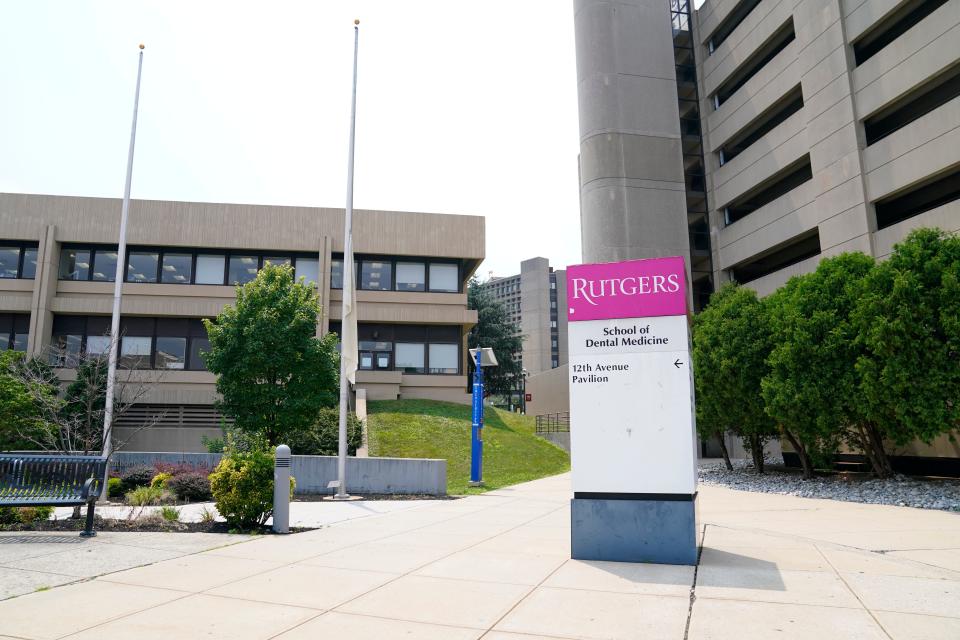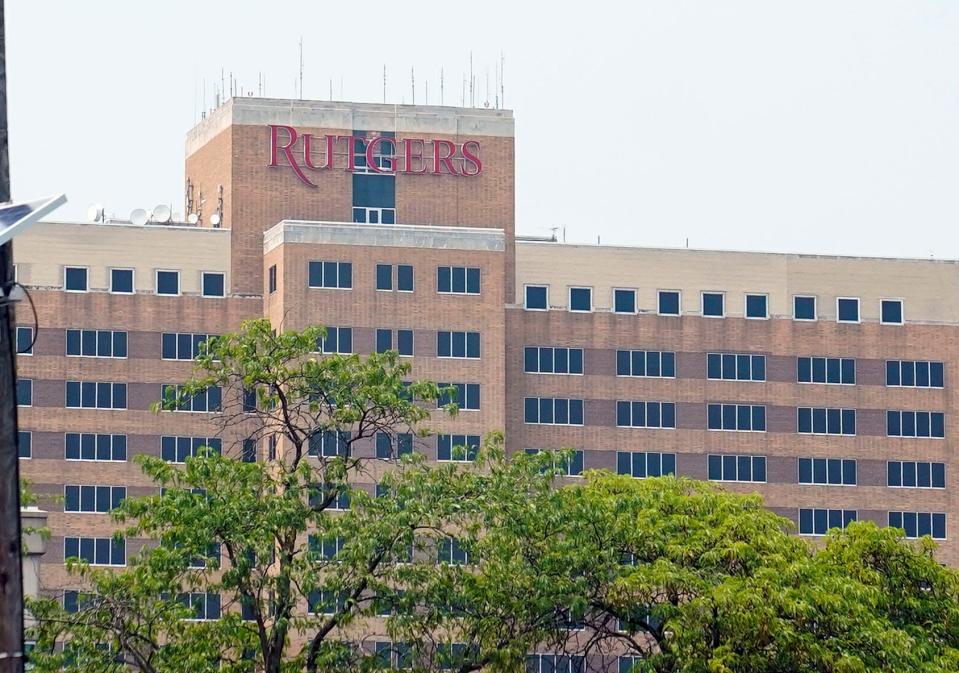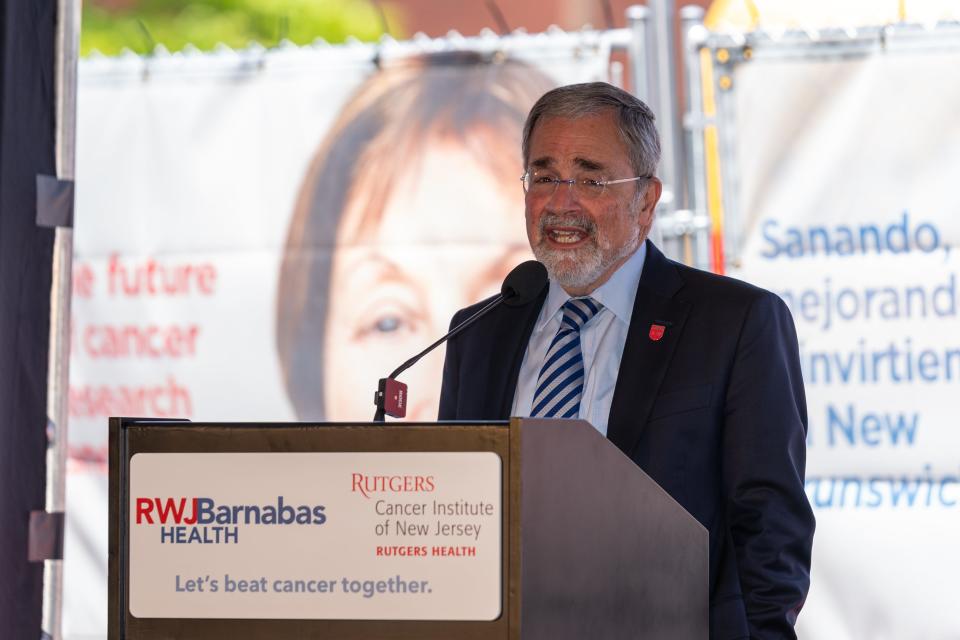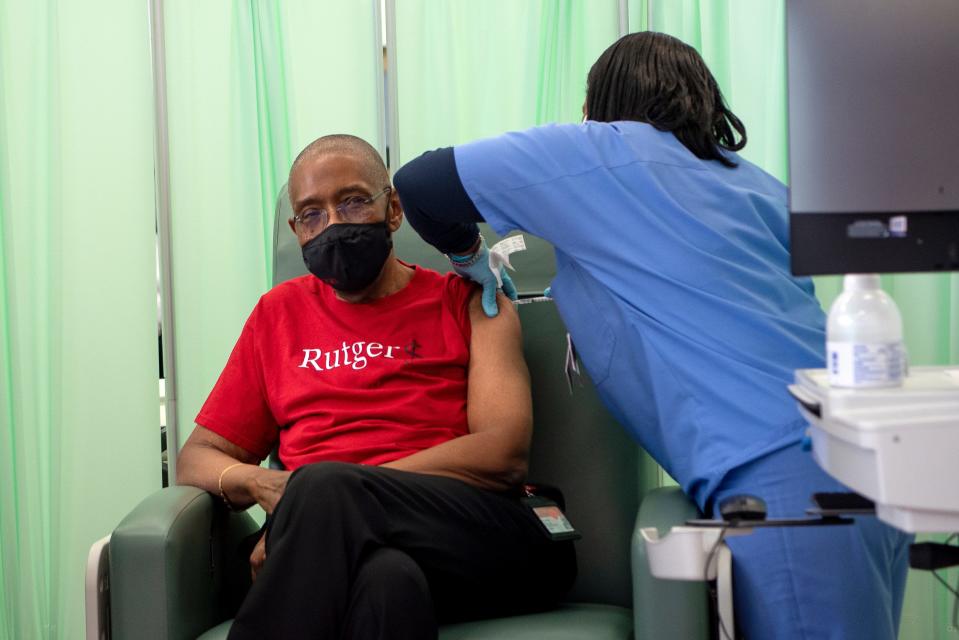Rutgers Senate votes lost confidence in President Holloway over medical school merger plan
Just months after a first-ever faculty strike, Rutgers University's move to launch a merger of the state's two largest public medical schools has once again divided the campus, with some medical faculty members asking if a merger is even necessary, and prompting an emergency session of the University Senate on Friday to issue a vote of lost confidence in Rutgers President Jonathan Holloway over the issue.
Many say their concerns were ignored, and that the Board of Governors rushed to approve the merger just three days after releasing a report on a key question: whether medical residency options for the top students in the system could be weakened by combining the two schools.
At a Rutgers board meeting July 10, only Brian Strom, chancellor of Rutgers Biomedical and Health Sciences, defended the merger. Board members stayed quiet, voting to approve the motion without any discussion, after 12 members of the public testified against the merger.
The vote occurred after three years of reports, evaluations and assurances from Strom and Holloway that appear to have convinced few about the merger's benefits.

Faculty councils at both medical schools disagreed with implementing the merger right now. Many unresolved questions remain, the councils said in letter sent to the Rutgers Board of Governors in March, asking it to wait for a supportive vote from the faculty before moving forward.
On Friday afternoon, the University Senate's executive committee, in an emergency meeting, passed a resolution noting that since Holloway allowed the Board of Governors to vote on the medical schools' merger even after the Senate had asked for the vote to be postponed, the Senate "has lost confidence in the leadership of President Holloway representing the values of shared governance."
The resolution called for Holloway to pause the merger until the University Senate has had the opportunity to review Strom’s full proposal and issue a decision regarding whether it should proceed. It also called for a public re-commitment by Holloway to the principles and values of shared governance.
Paul Boxer, a member of the Senate, said the executive committee operates as the full Senate when the Senate is out of session during the summer.
Dory Devlin, a Rutgers spokeswoman, issued a statement in response. "Throughout his time as Rutgers president, President Holloway has respected the advisory role of the Senate and will consider this resolution with the seriousness that he has considered all resolutions of the Senate as it fulfills its role in shared governance with an advisory voice on important matters," she said.
"The Board unanimously approved the administrative merger of the two medical schools provided that certain provisions are met including that the two schools maintain their presence in their respective cities (Newark and New Brunswick) and that the university’s commitment to the City of Newark is undiminished by this entirely organizational and administrative restructuring," she said.
'Natural' and 'logical' thing to do
Merging New Jersey Medical School in Newark and Robert Wood Johnson Medical School in New Brunswick was the “natural” and “logical” thing to do, Strom told NorthJersey.com in an interview. The merger, first floated by Strom in 2019, follows recent expansions — Rutgers’ 2013 merger with the University of Medicine and Dentistry of New Jersey and a 2018 partnership with the private health system RWJBarnabas Health.
The new merger would give Rutgers medical students cross-campus experience in a university hospital, private hospital and safety net hospital, with a “wider array of clinical clerkships and electives and types of patient experiences, without the current administrative barriers,” Strom said.
But bigger isn’t necessarily better in medical education, say many faculty members who oppose the idea.
The merger would have very little impact on clinical care and on medical education, because the two schools collaborate anyway, they say. Collaboration needs to be improved, but not through a merger that would bring an additional administrative layer to an already stressed system, said Dr. Laura Willett, who taught and practiced primary care at the New Brunswick medical campus and retired as professor emerita in January.

Willett was also part of the first in-house committee that Strom created in 2019 to report on the pros and cons of a potential merger. The committee supported Strom’s goals but said that without a “bold, transformational change” that could only come from a huge donor or financial boost to the schools, the merger was not justified.
Combining two “under-resourced” schools into one didn’t bode well for all its students, Willett said. “If the chancellor had been able to locate a major donor who wanted their name on the largest medical school in the U.S., we would have heartily endorsed such a plan,” she said.
Reducing student residency options?
The biggest sticking point is whether expanding the class size from 180 in each school to 360 in a merged school would undercut the most accomplished students as they try to get admitted to the most prestigious residency programs. The programs provide the in-hospital training medical students receive in their specializations.
Top schools have limits on how many students they will accept from a single school, so combining the two might disadvantage students at Rutgers, Willett said.
“The huge size of a merged school would likely make our school less attractive to those highly qualified students,” Willett said in a letter she wrote to the board.

The residency question was important, Strom acknowledged, but should not be a concern, he said, pointing to findings from the independent consultancy group ECG, hired by Rutgers. Leaders representing a range of graduate programs do not see a merged program harming student chances, he said, citing the report.
Leaders were “nearly unanimous in indicating that they did not view a merged school as being a disadvantage to students seeking placement in their programs due to any 'limit' on how many graduates they take from a given medical school," Strom said in an email.
The ECG report was “disappointing” and not convincing to veteran educators, Willett said.
Faculty members question 'shared governance' commitment
The skirmish between Rutgers leadership and its faculty over the merger echoes the university’s first-ever campus-wide faculty strike in April. Then and now, the administration has been accused of rejecting the faculty’s role in the "shared governance" of the university, since the board went ahead with the merger without consulting with the University Senate. The Senate, a faculty governing body, had passed an emergency resolution asking the board to remove the vote from its agenda.
Strom called the Senate’s resolution a delay tactic. “The Board of Governors decided it was time to do this, and there was no no reason to keep delaying,” he said. There are a lot of “unknowns,” he said, insisting that he has provided answers to the best of his ability but faces resistance and anxiety from some quarters as a “change agent.”

Operating two medical schools under Rutgers Biomedical and Health Sciences creates an “artificial separation” that “hurts our ability to teach optimally, to provide the best care, and hurts our reputation,” he said.
Both he and Holloway have pledged to invite faculty participation and community input as the merger goes forward, and to examine impact on residencies. "Residency placement is understandably of great importance to our students and faculty, and we will be closely monitoring any placement patterns going forward," Strom said.
The yes vote was already “a done deal,” said Boxer, the University Senate member. “We were taken by surprise,” he said, referring to the one-week notice Strom gave to the Senate before the board voted. All that Strom had to do was take up the Senate’s offer to convene an emergency meeting in the summer and discuss the final merger proposal, but he did not do that, Boxer said, incensed by Strom's suggestion that the Senate was delaying.
The Board of Governors asked no questions about financial impact and went ahead with the vote in a manner that suggested it was “pre-arranged in closed meetings,” said Willett, a former Senate member.
Concerns about diverting resources from low-income residents
Newark politicians and advocates, including Mayor Ras Baraka, several doctors at University Hospital and the Newark Community Coalition, say the merger would divert attention and resources away from already marginalized and low-income Newark residents.
“Realistically, the people of Newark are nervous, given the history of Newark, that they're going to get cheated and that we risk abandoning University Hospital in Newark," Strom said. "They're worried about that. That's not going to happen. These will be two co-equal campuses. That has been absolutely inviolate since the beginning.”
There remains widespread faculty disappointment with how “joint” chairs have managed previously merged medical departments since the 2013 merger of Rutgers with UMDNJ, and fears about how salaries, bonuses and work schedules for physicians in the two medical schools would shake out after the newest merger.
Quality-of-life and commuting pressures are another concern for physicians, who worry they may have to work in both campuses after the merger.
“Our members just aren’t going to have an appetite for these grand visions,” especially in the aftermath of the COVID-19 pandemic, which had already stressed the medical community, said Diomedes Tsitouras, a non-faculty member and executive director of the RBHS-AAUP union, representing medical faculty.
Fewer than a third of faculty members surveyed on both campuses felt that a merger would benefit them or their programs, according to a survey conducted by faculty councils at both medical schools last year.
And more than 80% of faculty members wanted a detailed fiscal and operational plan laid out before the merger went ahead. The university has not provided any of this, Strom’s critics say.
Five-year process
The merger would take five years to complete and must be approved by an independent accreditation body, the Liaison Committee on Medical Education.
A merged medical school would make Rutgers Medical School one of the largest in the nation and give it a significant improvement in US News & World Report rankings, Strom has repeatedly said — a fact that Willett disputes, saying the ranking bump would be small. But that's just one issue on which they disagree.
“The bigger question is: What problems is the merger solving?” asked Willett. “There is no compelling reason for it.”
This article originally appeared on NorthJersey.com: Rutgers medical schools merger questioned by faculty

